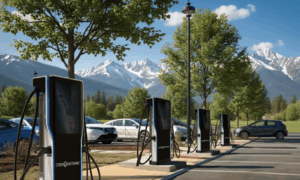
Home / EV Charging News / The Psychology of Electric Car Adoption: Investigating the psychological factors influencing consumer attitudes and behaviors towards electric cars, and how to address barriers to adoption
With the rise of environmental consciousness and the need for sustainable transportation options, electric cars have gained significant attention in recent years. However, despite their numerous benefits, widespread adoption of electric cars is still relatively low. Understanding the psychological factors that influence consumer attitudes and behaviors towards electric cars is crucial for addressing barriers to adoption and promoting a sustainable future. In this article, we will delve into the psychology behind electric car adoption and explore strategies to overcome barriers.
One of the key factors driving electric car adoption is the perceived environmental benefits they offer. Concerns over climate change and the need for sustainable transportation solutions have propelled many consumers to consider electric cars. The reduction of greenhouse gas emissions and improved air quality are significant advantages that electric cars provide over traditional combustion engine vehicles. By highlighting these benefits, consumers can be encouraged to make the switch.
Additionally, cost savings and efficiency play a crucial role in consumer decision-making. Electric cars offer lower fuel and maintenance costs compared to their gasoline counterparts. Moreover, government incentives and tax breaks further enhance the financial appeal of electric cars. Educating consumers about these advantages can positively influence their attitudes towards electric car adoption.
While electric cars offer numerous benefits, several psychological barriers hinder their widespread adoption. One prominent barrier is range anxiety, the fear of running out of battery charge during a journey. Many consumers perceive electric cars as having limited range and inadequate charging infrastructure. Addressing range anxiety through accurate information, technological advancements, and an expanded charging network is crucial for alleviating consumer concerns.
Another psychological barrier is the limited charging infrastructure. The accessibility and availability of charging stations play a vital role in consumer adoption. To overcome this barrier, it is essential to invest in the development of a robust charging infrastructure network that is easily accessible and convenient for electric car owners.
Familiarity and habit also influence consumer behavior towards electric cars. Psychological inertia and resistance to change can deter individuals from adopting electric cars. Promoting familiarity through education and providing opportunities for consumers to experience electric cars firsthand can help overcome this barrier.
Perceived performance and driving experience are additional psychological factors that affect consumer attitudes towards electric cars. Many consumers associate electric cars with slower speeds and a lack of excitement. Breaking these stereotypes by highlighting the performance capabilities of electric cars and enhancing the driving experience can shift consumer perceptions.
Social norms and peer influence have a significant impact on consumer behavior. When it comes to electric car adoption, positive peer influence can be a catalyst for change. By showcasing electric cars as a socially responsible choice and emphasizing the environmental benefits, individuals can be encouraged to adopt electric cars as a way to contribute to a sustainable future.
Stigma and image concerns also play a role in consumer attitudes towards electric cars. Some individuals perceive electric cars as lacking prestige or associating them with inconvenience. Addressing these concerns by showcasing the positive image and prestige of electric car ownership can help overcome these barriers.
To promote electric car adoption, several psychological strategies can be employed. Education and awareness campaigns are essential to dispel myths, provide accurate information, and highlight the benefits of electric cars. By addressing misconceptions and increasing knowledge, consumers can make more informed decisions.
Financial incentives and support can also be effective in encouraging electric car adoption. Government subsidies and tax incentives make electric cars more financially attractive. Additionally, offering favorable financing and leasing options can lower the upfront costs associated with electric car purchases.
Improving charging infrastructure is another critical strategy. Expanding the network of charging stations, especially in residential areas and along major travel routes, enhances convenience and alleviates range anxiety.
Lastly, collaboration between stakeholders is essential. Partnerships between automakers, government bodies, and energy providers can facilitate the development of a cohesive and supportive ecosystem for electric car adoption. By working together, these stakeholders can address barriers more effectively.
The psychology of electric car adoption involves understanding the perceived benefits, psychological barriers, and social factors that influence consumer attitudes and behaviors. By addressing range anxiety, improving charging infrastructure, promoting familiarity, and combating stigmas, we can overcome psychological barriers and encourage electric car adoption. With education, financial incentives, and collaborative efforts, we can pave the way for a sustainable future powered by electric cars.



